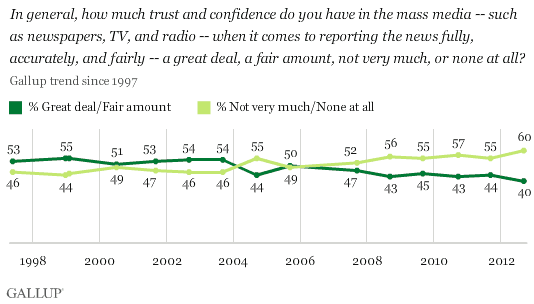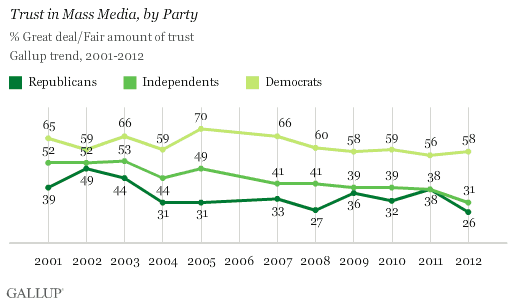

SUBSCRIBE TO OUR FREE NEWSLETTER
Daily news & progressive opinion—funded by the people, not the corporations—delivered straight to your inbox.
5
#000000
#FFFFFF
To donate by check, phone, or other method, see our More Ways to Give page.


Daily news & progressive opinion—funded by the people, not the corporations—delivered straight to your inbox.
Fewer are watching. And those that do tune in are less and less impressed by what they see.
That's the discovery of a new Gallup poll conducted earlier this month and released today in a report that shows Americans' distrust of the corporate press, and specifically political news coverage, hit an all-time high this year, with 60% saying they have little or no trust in the mass media.

The negativity toward the media is at an all-time high for a presidential election year. This reflects the continuation of a pattern in which negativity increases every election year compared with the year prior. The current gap between negative and positive views -- 20 percentage points -- is by far the highest Gallup has recorded since it began regularly asking the question in the 1990s. Trust in the media was much higher, and more positive than negative, in the years prior to 2004 -- as high as 72% when Gallup asked this question three times in the 1970s.
Distrust was also measured by political affiliation, where Gallup found that Republicans are the least trustful of the news, followed by those who consider themselves independents. Democrats exhibit the most confidence in the media, but even their level of trust topped out at less than 60%.

Interestingly, and though the answer would certainly vary across the political spectrum, Gallup did not take the time to ask the poll's respondents why they distrust the mass media in the United States.
Perhaps that's one question you don't need a poll to answer.
###
Dear Common Dreams reader, The U.S. is on a fast track to authoritarianism like nothing I've ever seen. Meanwhile, corporate news outlets are utterly capitulating to Trump, twisting their coverage to avoid drawing his ire while lining up to stuff cash in his pockets. That's why I believe that Common Dreams is doing the best and most consequential reporting that we've ever done. Our small but mighty team is a progressive reporting powerhouse, covering the news every day that the corporate media never will. Our mission has always been simple: To inform. To inspire. And to ignite change for the common good. Now here's the key piece that I want all our readers to understand: None of this would be possible without your financial support. That's not just some fundraising cliche. It's the absolute and literal truth. We don't accept corporate advertising and never will. We don't have a paywall because we don't think people should be blocked from critical news based on their ability to pay. Everything we do is funded by the donations of readers like you. Will you donate now to help power the nonprofit, independent reporting of Common Dreams? Thank you for being a vital member of our community. Together, we can keep independent journalism alive when it’s needed most. - Craig Brown, Co-founder |
Fewer are watching. And those that do tune in are less and less impressed by what they see.
That's the discovery of a new Gallup poll conducted earlier this month and released today in a report that shows Americans' distrust of the corporate press, and specifically political news coverage, hit an all-time high this year, with 60% saying they have little or no trust in the mass media.

The negativity toward the media is at an all-time high for a presidential election year. This reflects the continuation of a pattern in which negativity increases every election year compared with the year prior. The current gap between negative and positive views -- 20 percentage points -- is by far the highest Gallup has recorded since it began regularly asking the question in the 1990s. Trust in the media was much higher, and more positive than negative, in the years prior to 2004 -- as high as 72% when Gallup asked this question three times in the 1970s.
Distrust was also measured by political affiliation, where Gallup found that Republicans are the least trustful of the news, followed by those who consider themselves independents. Democrats exhibit the most confidence in the media, but even their level of trust topped out at less than 60%.

Interestingly, and though the answer would certainly vary across the political spectrum, Gallup did not take the time to ask the poll's respondents why they distrust the mass media in the United States.
Perhaps that's one question you don't need a poll to answer.
###
Fewer are watching. And those that do tune in are less and less impressed by what they see.
That's the discovery of a new Gallup poll conducted earlier this month and released today in a report that shows Americans' distrust of the corporate press, and specifically political news coverage, hit an all-time high this year, with 60% saying they have little or no trust in the mass media.

The negativity toward the media is at an all-time high for a presidential election year. This reflects the continuation of a pattern in which negativity increases every election year compared with the year prior. The current gap between negative and positive views -- 20 percentage points -- is by far the highest Gallup has recorded since it began regularly asking the question in the 1990s. Trust in the media was much higher, and more positive than negative, in the years prior to 2004 -- as high as 72% when Gallup asked this question three times in the 1970s.
Distrust was also measured by political affiliation, where Gallup found that Republicans are the least trustful of the news, followed by those who consider themselves independents. Democrats exhibit the most confidence in the media, but even their level of trust topped out at less than 60%.

Interestingly, and though the answer would certainly vary across the political spectrum, Gallup did not take the time to ask the poll's respondents why they distrust the mass media in the United States.
Perhaps that's one question you don't need a poll to answer.
###